coming to light
… as heimlich [familiar, homelike, or surreptitious, secret] progresses through its shades of meaning, it eventually coincides with its opposite, unheimlich, which the German writer Schelling defined as “the name for everything that ought to have remained … hidden and secret, and has become visible.” … In the annals of etymology, where heimlich and unheimlich reveal themselves as one and the same, we find the secret to this very particular kind of anxiety, Freud tells us, which arises from the encounter not after all with something new and foreign but rather with something familiar and old from which the mind has been estranged by the process of repression. Something that ought to have been kept concealed, but that has nevertheless come to light.
-Nicole Krauss, Forest Dark
Y’all, it’s been a WINTER: ten weeks of intensity, of newness and of return, of hibernating and of shedding—of things long concealed or suppressed that have nevertheless come to light. I’ll elaborate, but first, here’s a summary of how that’s manifested in my work since the beginning of the year.
Right after the start of 2019, I went back to France—Reims, this time—for the last Konstanzes of the Clermont-Ferrand production of Entführung. It was so wonderful and so sad. I performed the opera both better (I can really sing the role now) and worse (as old habits clashed with new ideas and upswellings of feeling) than ever before. It was the end of many stories, the beginning of others, both a celebration of what the team has made and experienced together over the last year and a vulnerable bringing to light of new aspects. I’m deeply mourning it, and I’m also happy to take everything it’s given me into new projects, to move on.
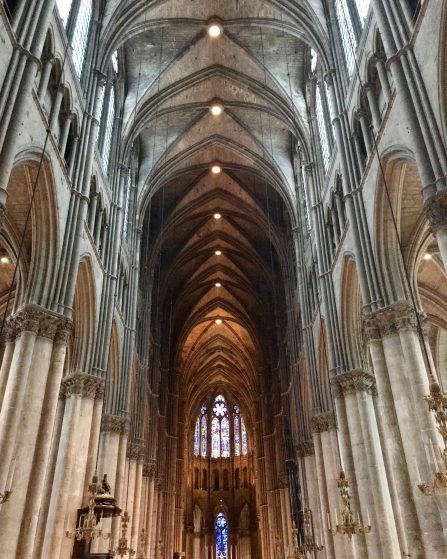
Reims Cathedral, early January
Soon after, I flew to Glasgow and sang big-girl Berlioz and Dutilleux cycles with the BBC Scottish Symphony Orchestra with a pal at the podium, an absolute dream of a gig. I was very prepared, I managed a tight rehearsal schedule well, I was more in command of my physicality and musical ideas and vocal colors than I have ever been (although I can still hear things I want to improve, of course). It’s on the BBC website until March 16th if you want to listen.
Next, I sang a program with Cappella Amsterdam in which I was both soloist and chorister. As the rehearsals went along, I finally had to face the painful realization that I can’t sing all kinds of music all the time, and this kind—thinning my sound down to a thread for most of a project—needs to be put to bed at last. I’m glad I didn’t listen to people who wanted me to make this decision at age 21, or 25, or 30, because I would have missed so much glorious music-making and so many good relationships. But during those days, my body was so clear on what it wanted, and it wasn’t this. I am trying to remember that this isn’t a loss of identity or a rejection of people and music I care about; it’s physiological, a shift of specialization within the same sport.
I practiced a lot of Handel and Bach, some old and some new, finally getting myself out of old habits, and (after some years feeling uneasy that I wasn’t singing much early music in the Netherlands) realized emphatically that this music is deeply in my bones and that I don’t need to worry, even if my sound isn’t to everyone’s taste. I had two auditions and a concert, all pleasures (even the auditions, unusually) that showed me that I should take the lead more in this repertoire. I truly know what I want and how to get there. There’s still plenty to learn, but I have authority—much more than I had ten years ago in fact, when I had a reckless confidence that got me pretty far but has since required me to humble myself and almost start again.
I performed two song programs in the same day with two exquisite pianists and friends with whom I can dive deep into this most intimate but expansive form. This, also, is the music and the depth of work I always want to be doing. Both collaborations are pointing in exciting directions and I can’t wait to go further with them.
I spent a week in London, where long ago I studied and dreamed and was disappointed for two years. Although I travel there often now, this trip brought many things full circle. I re-experienced the aching combination of love, possibility, and crushing alienation I associate with the city; many previous versions of myself flashed through my mind; many ambitions I had as a student there are only just now being realized, and in different ways than I expected.
For the rest: more intensity, in work and in life. I traveled a lot; I would be home for a few days and catch up on sleep, then get behind again as soon as I went back on the road. I caught a cold and had to kill it in four days between performances. At home, I left scores and clothes in untidy stacks; I never fully unpacked my suitcase or toiletries kit; I still haven’t sewn up the holes in a growing pile of sweaters needing repair; my laptop hasn’t been backed up since Christmas. I had some voice lessons again for the first time in far too long. I heard some great performances and saw some really good art. Many things in private life (mine and those of family and close friends) shifted, in ways startling and joyful and scary. And last week, I made a day trip to the UK to sing at the funeral of someone I knew.
All this was between January 1st and mid-March 2019.
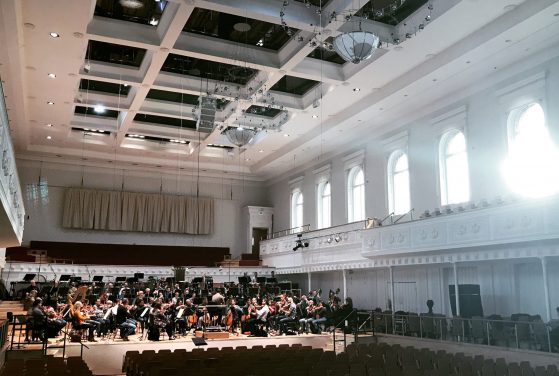
Glasgow City Halls, late January
Although there have been many moments of reckoning (heimlich coincinding with unheimlich—the familiar and the foreign, the long hidden finally come to light), it’s the funeral that’s sticking in my mind as I sit in a cafe in Madrid, trying to make my vermouth on ice last as long as possible and wrapping my head around the last few months.
The funeral was for the brother-in-law of one of my closest friends, a pianist. I had met the brother-in-law a few years before (when he was already suffering from debilitating illness) at a wedding—a fun and colorful weekend to which I was invited as both a singer and as my friend’s guest. Meeting the extended family both explained many things about my friend and solidified our feeling of each other as chosen family, truly first-tier people in each other’s lives, someone for whom I would travel much further than the short hop across the North Sea if needed. He and I were together in Rotterdam for rehearsals in early February when he got the news of his brother-in-law’s death. We were preparing songs of Messiaen, Debussy, Wolf, and Mozart, including Abendempfindung—four minutes of Mozart’s simplest and most profound music, a song sung by someone beloved who is dying, comforting those who will remain behind. We put in a little more rehearsal time before he left to fly back home, and at a certain moment this song became too much for us both.
This moment was back in my mind a few weeks later during the funeral. My friend organized the music, and Abendempfindung was the natural choice as an offering. The song opens in arpeggiated F major, and then an expansive but simple statement: “Abend ist’s,” it is evening. The music unfolds, is harmonically enriched and the vocal range extended, until it pivots comfortingly back to the home key for the final, beautiful idea, repeated more and more softly to the end: “und ach, schäme dich nur nicht sie mir zu weih’n; o sie wird in meinem Diademe die schönste Perle sein” (and oh, do not be ashamed to weep for me; your tears will be the brightest pearls in my crown).
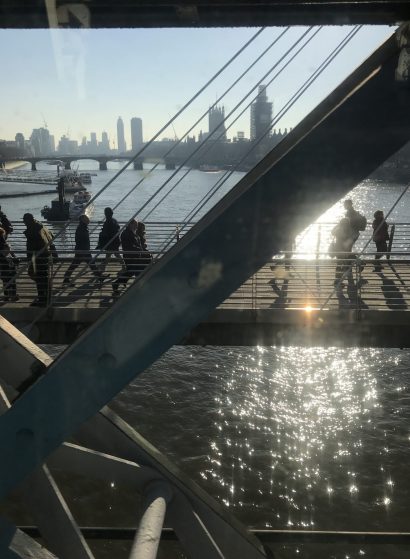
London, view over the Thames, mid-February
I have sung at many funerals, and I can keep my feelings separate from the work. But although I didn’t know this man well, it was hard to sing that day; I felt the force of the loss strongly among the group gathered in the church, and sadness constricted my throat and limited my breath and volume. Still, we’re pros, and we made it through the song, letting Mozart’s own structure spin out in quiet perfection even if our stewardship wasn’t perfect. And it did what music should do in this situation: it comforted. The text setting is very sensitive, but the song also has its own musical logic that needs no explanation. It advances in time, creating a moment of stillness and listening. It invites a different kind of shared experience than words alone; it can heal in another way.
Afterwards, I was happy to learn that it had been a calming moment for my friend’s sister on a very hard day. It was a reminder that even during periods when my work is high-profile, high-risk, and intensely shaped by my own feelings—including a final show in Reims which rendered me a gasping, sobbing wreck at the interval, calming down only after a long hug from someone very loved and a quiet half-hour in a dressing room—the simplest things can be the hardest, and also the most important. Loss, collective feeling, an out-of-tune organ shepherding people through familiar melodies, rain, the rhythms of ritual: these universal, non-operatic moments are what this crazy profession has evolved to support and beautify and make bearable. All the other trappings of life in the arts could vanish, and we’d still have this, and it’s important enough, and it’s difficult enough. These moments find us at our most vulnerable, at the edge of what’s normal.
Music in these situations brings to light things we usually prefer to keep hidden, and it can be soothing (as it was then) but it can also be uncomfortable and triggering. We’re not often so exposed, and these moments can threaten our carefully constructed defenses, can muddy deep waters of the soul we thought were pure. It’s hard for performers and audience, and every artist has to deal with these questions: how do we keep our boundaries clear emotionally? How do we give voice to very vulnerable things, bring them forward, while staying strong enough to deliver the message so others can share it? How do we manage periods of high intensity, keeping ourselves healthy while working on difficult material or singing in challenging circumstances?
A good singer friend recently asked these questions on Facebook while preparing a very confronting piece. How do we close ourselves off just enough, protect ourselves, move through the work? Her post got a fabulous range of replies. But the answer that struck me most was from a famous singer I respect enormously—I had recently listened to part of her Winterreise and been profoundly moved by it, and there she was, chiming in on this thread. (Social media has many evils, but I love when it makes me feel like the whole industry is having a cozy chat over a beer.) Her response was that you shouldn’t close yourself off, actually. In preparation and rehearsal, you have to be as open as you’re able, you have to allow the material to work on you in the most extreme way, you have to experience the full range of what it can evoke. Then you learn from that, decide what you want to use; and then you slowly figure out (still in rehearsal or practice) where all the necessary lines converge—the emotion, the material, the technique—and you gradually become comfortable with walking along that edge. By the time you perform, you will have enough practice being an open channel that all that experience and extremity can get through to others without destroying you.
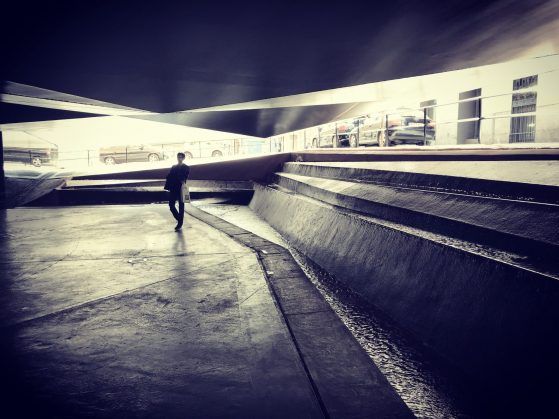
Madrid, Caixa Forum, early March
Art like she makes is, in my opinion, the highest achievement in this field. It strikes us so hard because it shows us the uncanny, the Unheimliche, that’s just fractionally behind our eyes all the time. It can dissolve our secrets, our Heimliche, our safe haven. It can bring things long concealed into the light—suppressed fears, irrational loves and desires. It can be terrifying to meet ourselves this way—to realize in the final song of Winterreise how close we all are to madness, to hear in Martern aller Arten’s final pages a desperate attempt to claim selfhood and agency in a world that would anonymize us, to see in Picasso’s Guernica faces disfigured by the shock of having just lost everything they’ve ever loved. Art can also do the opposite—it can bring the uncanny back around to something we recognize. Abendempfindung can (if only for a few moments) soothe a great loss. It can make us feel seen, cared for, home.
To relate all this back to my nutty year: I think I’ve spent a while now (not elegantly, not systematically, mostly not even consciously) doing the kind of painful, revealing work described by the singer I admire. I’ve been trying to open myself more fully to what life and work and music can do to me, learning what’s worth keeping and what’s better discarded, figuring out how the lines of emotion and material and technique converge, and integrating that into something that lets more of me through without breaking me in half. And it’s paying off. Although it’s been an intense few months since January, I’m feeling more balanced than I have in a long time. I wrote some raw stuff here in 2018 about body image, identity, vocal struggles, love, and anxiety and their intersections with my work—I know that some people value my candor and others find it off-putting; I’m leaving it all here for now and reserve the right to change my mind!—but in 2019 I seem to have turned a corner. I’ve been moving through intensity without recoiling or fracturing. I haven’t been debilitated by fear. I’ve let some of my perfectionism slide in less important areas but am holding myself to a higher standard in others. This has resulted in more generosity in my performances, collaborations, and friendships. I’m connecting more with people I care about, reading more, preparing more deliberately for my projects, sleeping better, singing better, and getting smarter about long-range planning and what work I accept and seek out. The work has been more intense, but my anxiety less. I’m beginning to suspect that I’ll be fine.
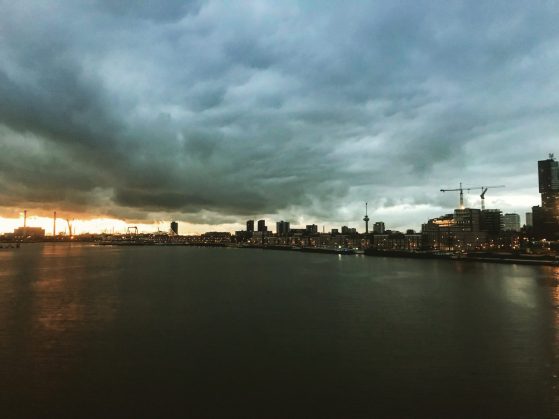
Rotterdam harbor: home
Was it Freud’s anxiety I was particularly experiencing last year, the kind that “arises from the encounter not after all with something new and foreign but rather with something familiar and old from which the mind has been estranged by the process of repression… something that ought to have been kept concealed, but that has nevertheless come to light“? In 2018 I repeatedly confronted assumptions and deeply-rooted fears from my past and began to deal with them at last as an adult, as an artist, as a fallible human. These included fear of missing out, which made me agonize over specialization and worry about the jobs I wasn’t getting. Now, as I accept that I can’t sing everything, I’m able to sing fewer things at a higher level. Also: fear of not measuring up, which actually is totally counterproductive; I sing worse when I feel like I have to impress people, and I’m most impressive when I’m secure in my abilities, not preoccupied with what someone else thinks. Fear of making people angry—that’s a big one, making it so, so difficult for me to say no to work, even when it wasn’t a good fit or would make me too busy. Fear of my own intensity—oh man, this one limited me in so many areas. It turns out that when I embrace my sometimes manic energy, my tendency to throw myself into projects and passions, as simply how I am and how I best function, I can more easily manage the unusual rhythms of my life instead of pathologizing them. Fear of fragmentation—I have many identities, many loves, many sides, and I’m realizing I don’t have to choose between them. All these fears have limited my work and singing in the past, and of course they’ve limited me personally. It’s time to move on, to let the music through honestly.
I just got back from a trip to Madrid. I should be practicing and organizing all the things and answering all the emails and doing all the admin. Instead, I’ve just tidied up, done a load of laundry, and finally hung some art that’s been sitting in a pile on the living room floor since the summer, when we moved into our new house. I’ll get to my work soon, but I’m reclaiming a little heimlich today. I don’t have to live at the edge all the time.

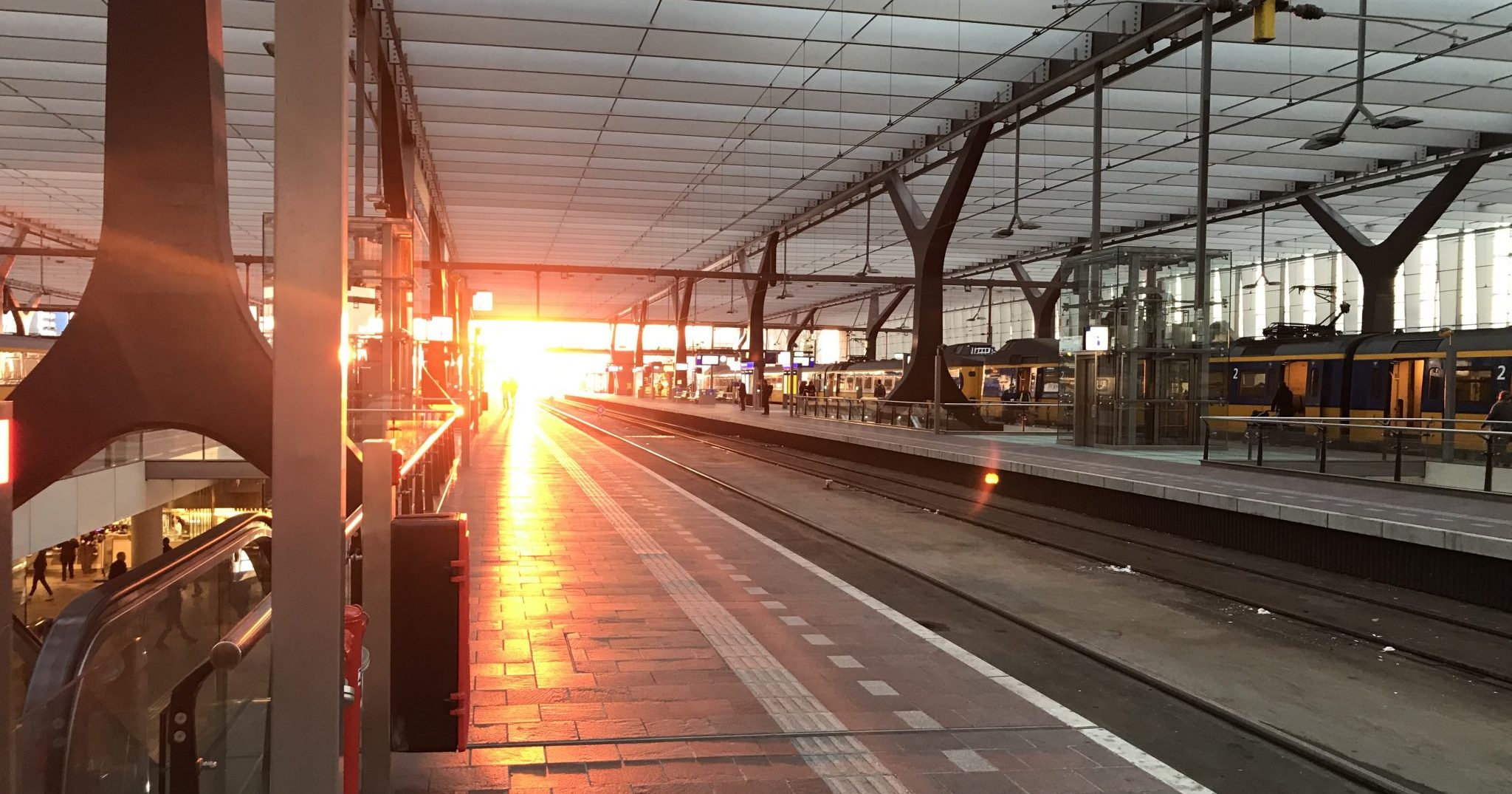
Jeannette Aster
March 12, 2019 at 8:57 amDearest Katherine!!! Thank you so much for sharing your “Heimlichste” thoughts and experiences. You write so beautifully,honestly and with such clarity. You touch many people with your words, your art, and your being. It is your signature as a performer, colleague, friend and above all Mensch! Bon continuation as we say in French. Biggest hugs to you and hope our paths cross again soon.
Gwen
March 29, 2019 at 3:00 pmSo glad you hung some art in your new home! ❤️❤️❤️
Gwen
March 29, 2019 at 3:42 pm“showed me that I should take the lead more in this repertoire. I truly know what I want and how to get there.”
Hear, hear!!